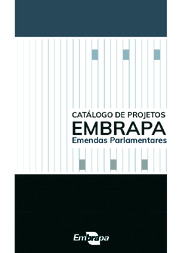Relations with Brazilian government and institutions
Embrapa's Relations with Branches of Government and Brazilian Institutions
Government and Institutional Relations (GIR) aim to help organizations build and strengthen relationships with the State and society, allowing public and private institutions to participate in different discussion forums including civil society, production sector and public authorities, and broaden dialogue, relationships and their participation, contribution and influence in decisions on themes of interest. At Embrapa, an area coordinated by the Secretariat of Intelligence and Strategic Relations (Sire), the area of institutional and governmental relations aims to strengthen political-institucional liaison with the Executive and Legislative branches of power and the entities that represent agricultural research, development and innovation sectors.
Operations
The area's operations are focused on the management of Embrapa's institutional and government relations with segments of society through respective institutional representatives: the Executive, the Legislature and representative entities. The lines of work at Embrapa's Institutional Relations are:
Public policy, government programs and plans
Scientific evidence is considered a valuable resource for legislative and the executive branches of power to operate and decide on the process of formulating, implementing and assessing public policy. As a public research, development and innovation company, Embrapa has promoted and supported the formulation, improvement and implementation of public policy on themes that relate to national agriculture and animal farming.
Institutional image strengthening
The offer of science-based knowledge and the establishment of permanent processes of interaction with public bodies and society improve confidence in Embrapa's capacity to generate value and, consequently, its institutional image. The management of institutional relations observes challenges and opportunities and ensures an efficient performance in external environments, adding value to the results achieved by agricultural research.
Budget
Embrapa dialogues with the Executive and the Legislature as it follows the processes of defining the public budget to ensure the necessary funds to support public research and innovation.
Institutional risks
The analysis of scenarios and the monitoring of external factors that can positively or negatively impact Embrapa's mission is one of the pillars of institutional relationship management. The corporation has developed processes of monitoring and action to respond to possible events that can impact its institutional image and its generation of value to society.
Networks and partnerships
This dynamic and competitive world, with challenges of higher complexity, needs actors that can have a more encompassing course of thought and action. Partnership, cooperation and relationship are essential conditions to overcome these challenges and generate concrete opportunities to formulate projects and implement actions that support public policy. With that, the innovation system becomes more dynamic. By integrating networks and consolidating partnerships, Embrapa works in sinergy with the remaining agents of society to build and consolidate institutional mechanisms to overcome present and future challenges.
 News about institutional relations
News about institutional relations
 Listador de Publicação
Listador de Publicação
A Embrapa, ao longo de seus 51 anos, contribuiu fortemente para que o Brasil fizesse a maior revolução social inclusiva do mundo, tornando-se um dos p...


